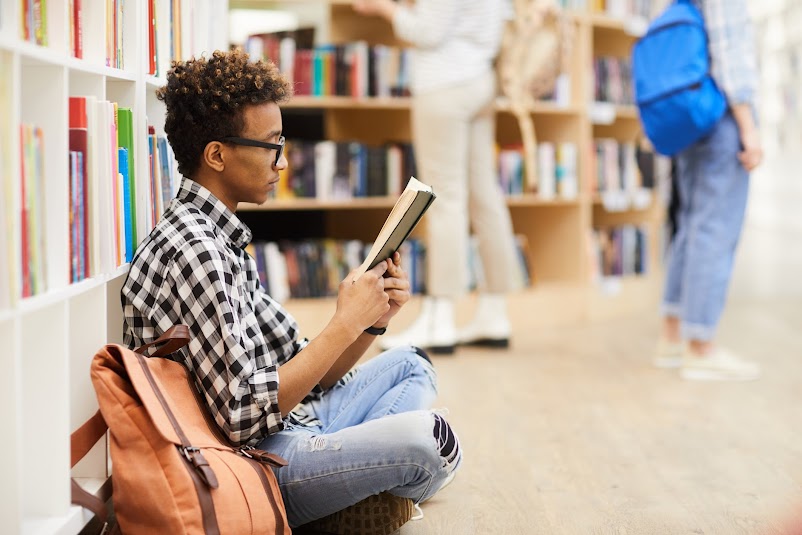An increase in book bans is likely to affect youth's mental health
I love books. And my favorite part about books is that there's no better way to transport yourself into someone else's life and perspective.
One character I particularly fell in love with last year was Felix in "Felix Ever After" by Kacen Callendar — a black transgender teen navigating high school, friendship and first love. *Note: Kudos to my place of employment, Blue Cross Blue Shield of Michigan, for encouraging employees to read this book through their Inclusion and Diversity book club!*
I wish I had a book like "Felix Ever After" in high school to open my eyes to gender identity and transgender issues that I, as a former Catholic school girl, unfortunately didn't learn about until I was in my 20s.
And that's why it makes me so mad that book bans are on the rise.
In Oklahoma, for instance, books like "Felix Ever After" — which I think should be mandatory high school reading — could be banned as a bill was recently introduced in the State Senate to prohibit public school libraries from keeping books on hand that focus on sexual activity, sexual identity or gender identity.
And what does this say to LGBTQ+ kids? That it's not OK to read books with characters like them, but it is OK to read books about heterosexual relationships and cis-gender main characters — like "Romeo and Juliet," where the two teenage main characters kill themselves when they think they can't be together. If anything "Romeo and Juliet" is way more damaging than any of the perceived effects from books like "Felix Ever After" or the children's book "Heather Has Two Mommies," which was recently banned from a school district in Pennsylvania.
According to the American Library Association, "In recent months, a national campaign demanding the censorship of books and resources that mirror the lives of those who are gay, queer, or transgender, or that tell the stories of persons who are Black, Indigenous, or persons of color have surfaced."
"More than 330 unique cases were reported to ALA’s Office for Intellectual Freedom (OIF) in the three-month period between September 1 and November 30, 2021. Thus far, challenge totals in 2021 have doubled the number of reports from 2020 (156 challenges) and most likely will outpace 2019 figures (377 challenges)."
Mental Health Effects of Book Bans
Book removals send the very destructive message that the life experiences of BIPOC and LGBTQ+ individuals don't matter.
Neuroscientist and clinical social worker Renetta Weaver told A Very Well Mind that book bans can lead to feelings of disconnect and isolation in people who are part of the groups that are being censored. So it's no wonder that book bans and the resulting feelings of isolation can then lead to mental health challenges like anxiety, depression, stress, imposter syndrome, suicidal ideations, etc.
"In working with children and youth, this lack of representation in learning materials is very damaging to their mental health as it reaffirms limiting beliefs about their purpose and potential. ... They have a hard time being heard and being seen because they secretly feel like they don’t belong, and they don’t want anyone to find them out," Weaver said.
Ariel Landrum, a licensed marriage and family therapist, told A Very Well Mind that she has seen, firsthand, how much it has helped her clients to have a character, whether it be in a book or a movie, who they can relate to. That's why inclusion and representation is so vital.
"Diverse characters in diverse books with diverse experiences increase validation and affirmation for marginalized clients. It allows them to provide examples regarding their lived experience to others without doing unnecessary mental and emotional labor," said Landrum.
And, while more books than ever are featuring diverse characters, kids need to have access to these books. They may not have the money to buy books at their local book store or transportation to get there. The school library may be the only place they can go to get their books.
Which is why it's so important that, here, they have access to books featuring as many diverse perspectives as possible. And, when these books aren't there or have been yanked from the shelves, it makes it seem like there's something wrong with these stories and subjects — when there's not.
"We want children and young adults to understand how the world works and their place in it, as well as how they can bring about change. Thus, we need to have these conversations about race, sexuality, gender, mental illness and other taboo topics that are too often the reason books are challenged or banned," writes The Daily Campus columnist Madeline Papcun.
"It’s not that all of these challenged books should be available in kindergarten classrooms, but older children and young adults need to have access to them. These books can spark conversations that can end up saving lives."
Click here to buy banned books from Barnes and Noble.











4 comments
hi
ReplyDeleteThis article highlights the troubling rise in book bans and how such censorship can increase stress and anxiety, especially among young people feeling silenced or misunderstood. For those struggling with the emotional impact of these societal pressures, Life Success Counseling offers compassionate couples counseling cincinnati ohio to help partners support each other through difficult times. Their professional guidance encourages healthy communication and emotional resilience, fostering stronger relationships amid external challenges. Seeking help can be a vital step toward healing and connection.
ReplyDelete"Banning books that represent LGBTQ+ and BIPOC experiences doesn’t just limit access to stories—it directly harms mental health. Representation fosters belonging and resilience, especially for marginalized youth navigating identity and emotional wellbeing."
ReplyDeleteGreat article glad to know about it CureCartDirect.
ReplyDelete